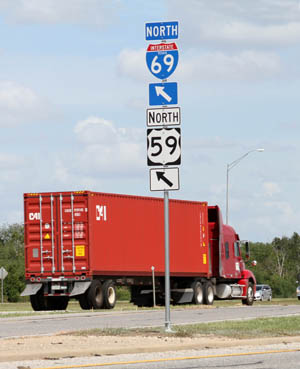• Multi-State I-69 Congressional Caucus Taking Shape
Six members of the U.S. House of Representatives have joined together to create an Interstate 69 Congressional Caucus with the mission of advancing the development of I-69 in the seven states along the interstate route. The bipartisan caucus intends to raise awareness of the strategic importance of I-69 as a freight corridor. I-69 will also enhance regional mobility, safety of the traveling public and local economic development.
Congressman Blake Farenthold (TX-27) of Corpus Christi took the lead in creating the caucus and the Alliance for I-69 Texas was instramental in the process. Farenthold is a member of the House Transportaton and Infrastructure Committee.
Serving as co-chairs of the group are Congressman Farenthold and Texas Congressman Henry Cuellar (TX 28) of Laredo, Congressman Ed Whitfield (KY-01) of Kentucky, Congressman Steve Cohen (TN-09) of Tennessee, Congressman Larry Bucshon (IN-08) of Indiana, and Congressman Bennie Thompson (MS-02) of Mississippi.
“As Texas’ economy continues to grow, so does the need for modern transportation infrastructure to move freight,” said Congressman Farenthold. “Goods moving through our ports, and the manufacturing items supporting the Eagle Ford shale boom need a more direct freight network, and that’s what this caucus is advocating for. I-69 links major commercial centers in the southern most states to the rest of the U.S. and Canada, and we’re working to ensure that it continues to be recognized as strategic and important. We are looking for a way to get this done in a financially responsible manner that respects private property rights.”
“With each overpass and every additional mile of I-69 upgrades, Texas will be able to create new jobs through trade and freight, and connect our communities in a way they have never been before,” said Congressman Cuellar. “Laredo alone sees 1.8 million truck crossings a year, and the communities from Hidalgo to Laredo support trade throughout our entire county. I-69 will clear up road congestion, improve highway safety, and generate economic growth throughout South Texas.”
"I-69 is a critical route in the United States, bringing thousands of jobs and billions of dollars in commerce to our country,” said Congressman Whitfield. “I am pleased to join Congressman Farenthold to co-chair this caucus and to serve as an advocate for the economic benefits resulting from a completed I-69.”
“With great companies like FedEx and a prime location in the Mid-South, Memphis is already one of the nation’s busiest freight transportation hubs,” said Congressman Cohen. “The completion of I-69 will add yet another transportation link to and from Memphis, create good-paying jobs and economic growth in our community, and help ease traffic congestion in our region.”
“Completing Interstate 69 is an important step to improve multi-modal freight movements across the United States,” said Congressman Bucshon. “In my home state of Indiana, I-69 presents a tremendous opportunity to move people and products more efficiently and is vital for the economy of Southern Indiana. I hope that we can accelerate I-69 projects, like the bridge between Evansville, IN and Henderson, KY, across the country. I’m happy to join my colleagues and lead this caucus to educate the House on the importance of this project as we move forward with transportation planning.”
“I am pleased to join my colleagues in launching a caucus that helps to strategically create jobs, develop infrastructure and improve transportation of goods for Mississippians and citizens across the country,” said Congressman Thompson. “The I-69 corridor adds efficiency to our freight system, promotes economic growth throughout the country and will serve millions of Americans.”
The Alliance for I-69 Texas board of directors voted earlier this year to encourage and help facilitate creation of a I-69 Congressional Caucus with the goal of having all states on the route participate. The adjoining map shows how I-69 will in the future cross from Texas into Louisiana near Joaquin and then run near Shreveport and into southeast Arkansas before crossing the Mississippi River. It will run north in Mississippi where one segment is completed and then into Tennessee, Kentucky and Indiana. The section from Indianapolis to the Canadian border has been in place since 1992.


